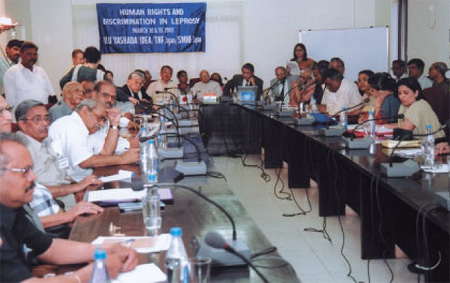|
AMBASSADOR'S JOURNAL
Moving Forward on Human Rights
Visits to Brazil and India focus attention on discrimination, while a trip to Cambodia shows that persons with leprosy still try to hide the disease.
BRAZIL (FEBRUARY 27-MARCH 1)
In late February I was in Brazil for a workshop in Rio de Janeiro on Human Rights and Leprosy (see page 2). When I visited Brazil in June last year, a health ministry spokesman said, in relation to leprosy strategy, “We were asleep.” Since then, the ministry has begun to move quickly, and is pursuing some forward-looking policies.
Most importantly, it is overhauling its approach to treating leprosy and incorporating it into the public health services, as has been done elsewhere in the world.
The ministry is now moving quickly and is pursuing some forward-looking policies.
In connection with this, it is conducting an ongoing survey of Brazil's 33 former colonies carried out by the health ministry with the cooperation of MORHAN with a view to ensuring the civil rights of people affected by leprosy, improving conditions for them and assisting with their rehabilitation and return to normal life.
An initial survey, conducted last November, found that facilities were poor, staff were in short supply and their level of quality variable. Basic health information is also lacking.
Further, colony residents with nowhere else to go and few links to society and family live in fear of what will happen if ever the colonies are closed. This, in turn, relates to unresolved issues concerning residence rights, property rights and the transfer of these rights to their children.
Telling it like it is: Cristiano Torres speaks out
“Treatment for Hansen's disease here”
Among those who spoke at the workshop, Cristiano Torres left the deepest impression on me. The head of a leprosy colony committee and the chairman of a leprosy soccer association, he was one of the Olympic torch bearers when the Olympic flame passed through Brazil in 2004. Mr. Torres stressed the importance of distinguishing between “leprosy” and “Hansen's disease.” Although in English it is common to refer to leprosy, in Brazil it is mandatory to use the latter term. As Mr. Torres explains it, leprosy is synonymous with suffering, Hansen's disease is not.
By the end of the two-day conference, a number of concrete proposals had emerged from the discussions. Where pertinent, these will be included in the report being prepared by Prof.
Yozo Yokota for the UN Sub-Commission on the Promotion and Protection of Human Rights.
On March 1, I went to Nova Iguaçu district on the outskirts of Rio de Janeiro to visit a regional health center and the Crurupatiti colony. Nova Iguaçu has the highest prevalence rate in Rio state, at 5/10,000. Between 1997 and 1999, the health center was shut for renovations, as a result of which 40% of registered leprosy patients stopped receiving treatment. Now the center is conducting active follow-up and treatment.
The colony, situated in a mountainous area, is spread out like a large village. In addition to a hospital, there are five residential districts that are home to around 1,400 people ― both recovered persons and their families as well as others. The facility is more than 50 years old, and those living there appeared to be contented and self-sufficient. However, as the workshop made clear, for Brazil's Hansen's patients, many issues remain unresolved with regard to residential rights, property rights and what the future holds.
INDIA (MARCH 17-21)
On March 18-19, I took part in another workshop on leprosy and human rights in Pune, Maharashtra State. In my opening remarks, I cited Raoul Follereau, who in letters and speeches half a century ago talked about leprosy as a curable disease and one that was difficult to catch. Appealing for an end to discrimination, he asked what it meant to be cured if after the fact a person was still called a “leper.”
Only recently is society waking up to the magnitude of this problem and starting to do something about it. Prof. Yokota, who took part in this workshop as well, said it was shameful that the UN was only now taking up the issue.
The keynote address was given by Chandrashekhar Dharmadhikari, a retired judge, who cited the need to change popular thinking if persons affected by leprosy are to be treated equitably by society.
Following the opening ceremony, International Leprosy Union Chairman Dr. S.D. Gokhale presented the findings of a survey on leprosy and human rights in four states: Bihar, Uttar Pradesh, Orissa and Maharashtra. The survey showed how disability is the starting point of discrimination and prejudice; that disability is a major cause of inequitable treatment in the job market; and that disability and poverty are deeply intertwined.
 Workshops such as this one in India are turning the spotlight on stigma and discrimination.
On a positive note, self-help movements of the disabled are beginning. Further, in various parts of India, it is now a legal requirement that disabled persons have a say in making policies and laws.
Concerning legislation, academics and lawyers pointed out that most people were unaware that leprosy-affected persons are covered by the disabilities act, although they acknowledged that in reality the act does not adequately recognize disability due to leprosy. They also highlighted the fact that leprosy remains grounds for divorce under India's marriage laws. For various forms of discrimination to be removed, they said, legislation must serve as an instrument of social change and laws must be “internalized” if they are going to have any effect.
A recovered person making car parts near Pune
|